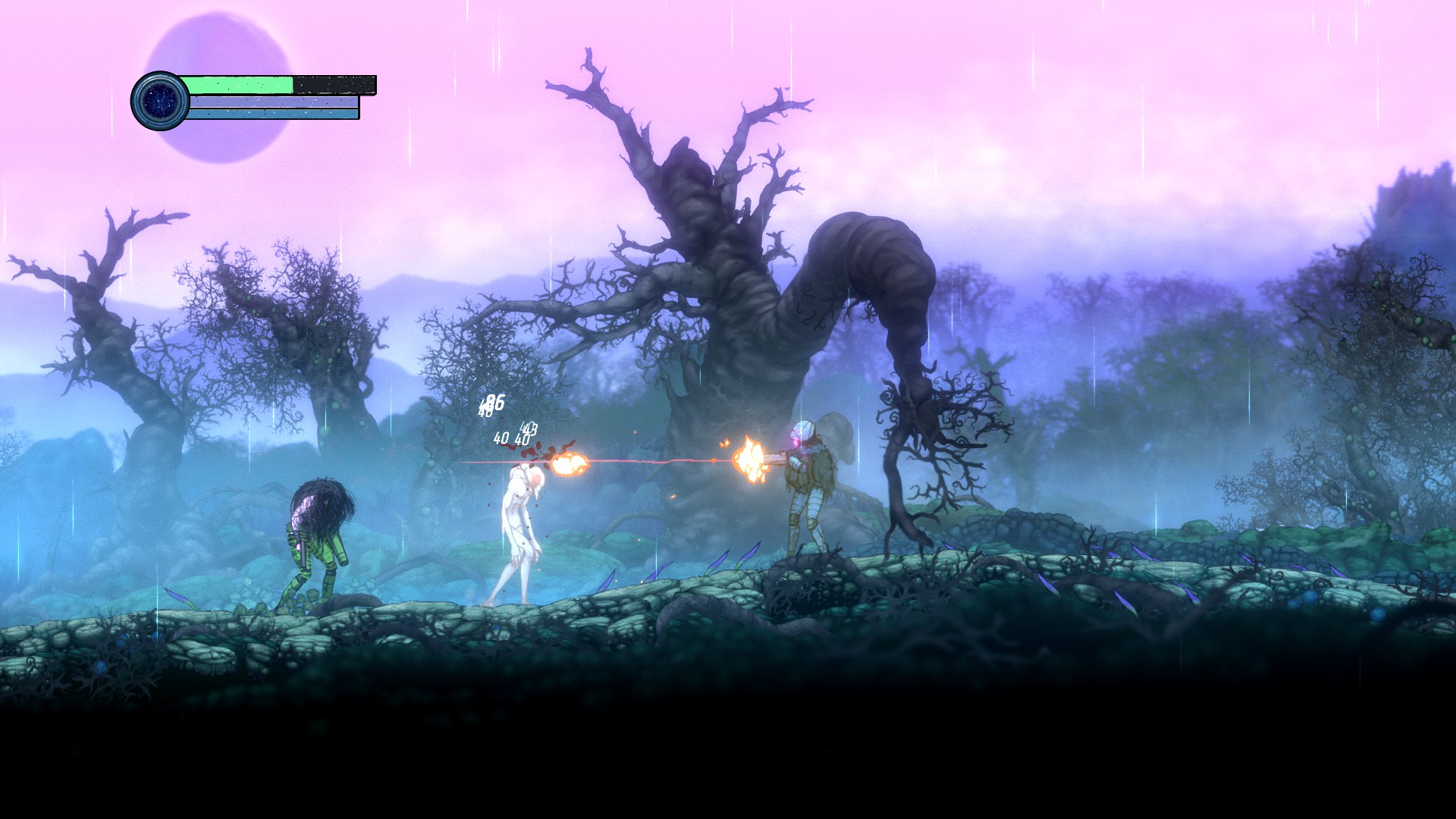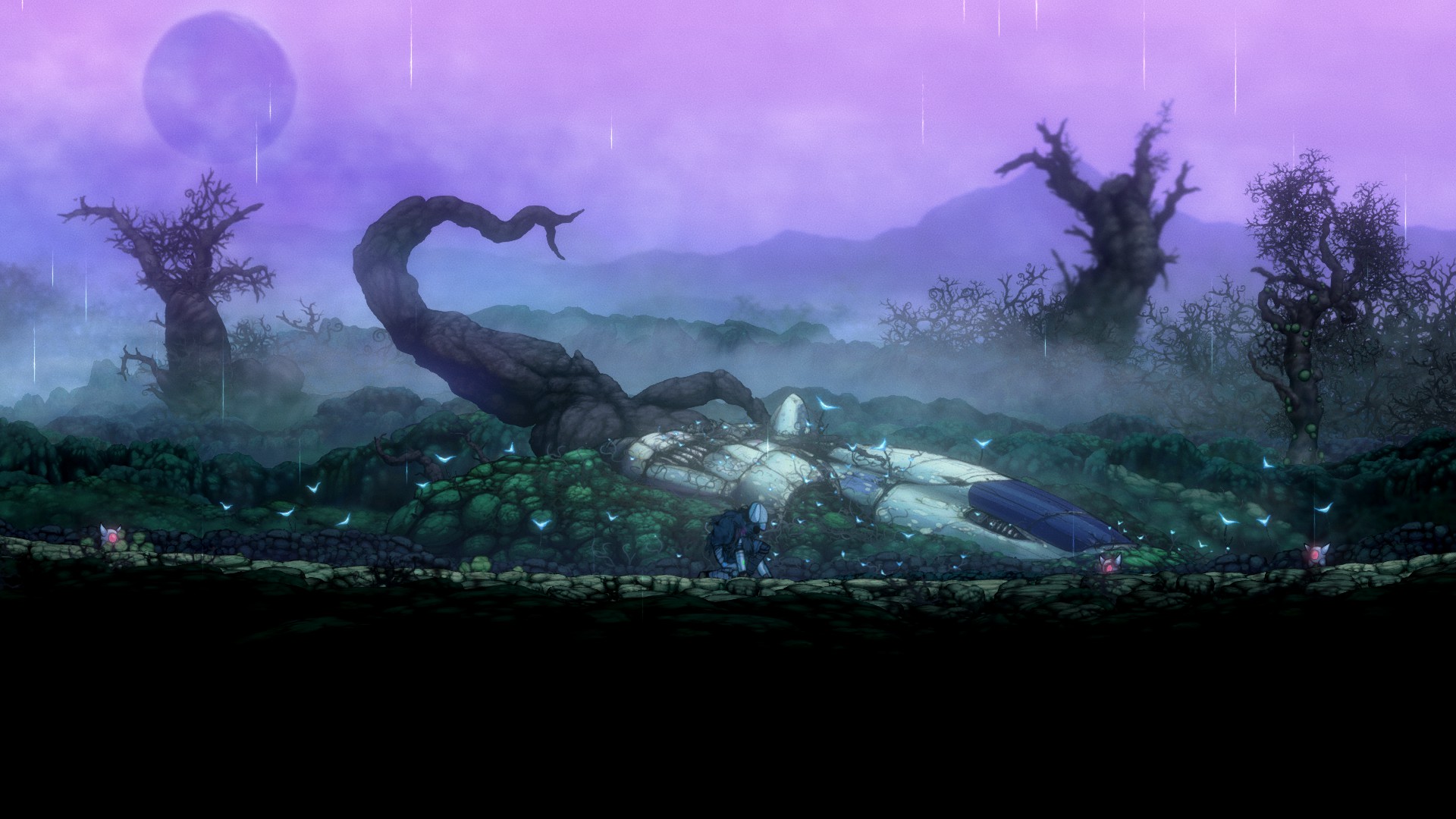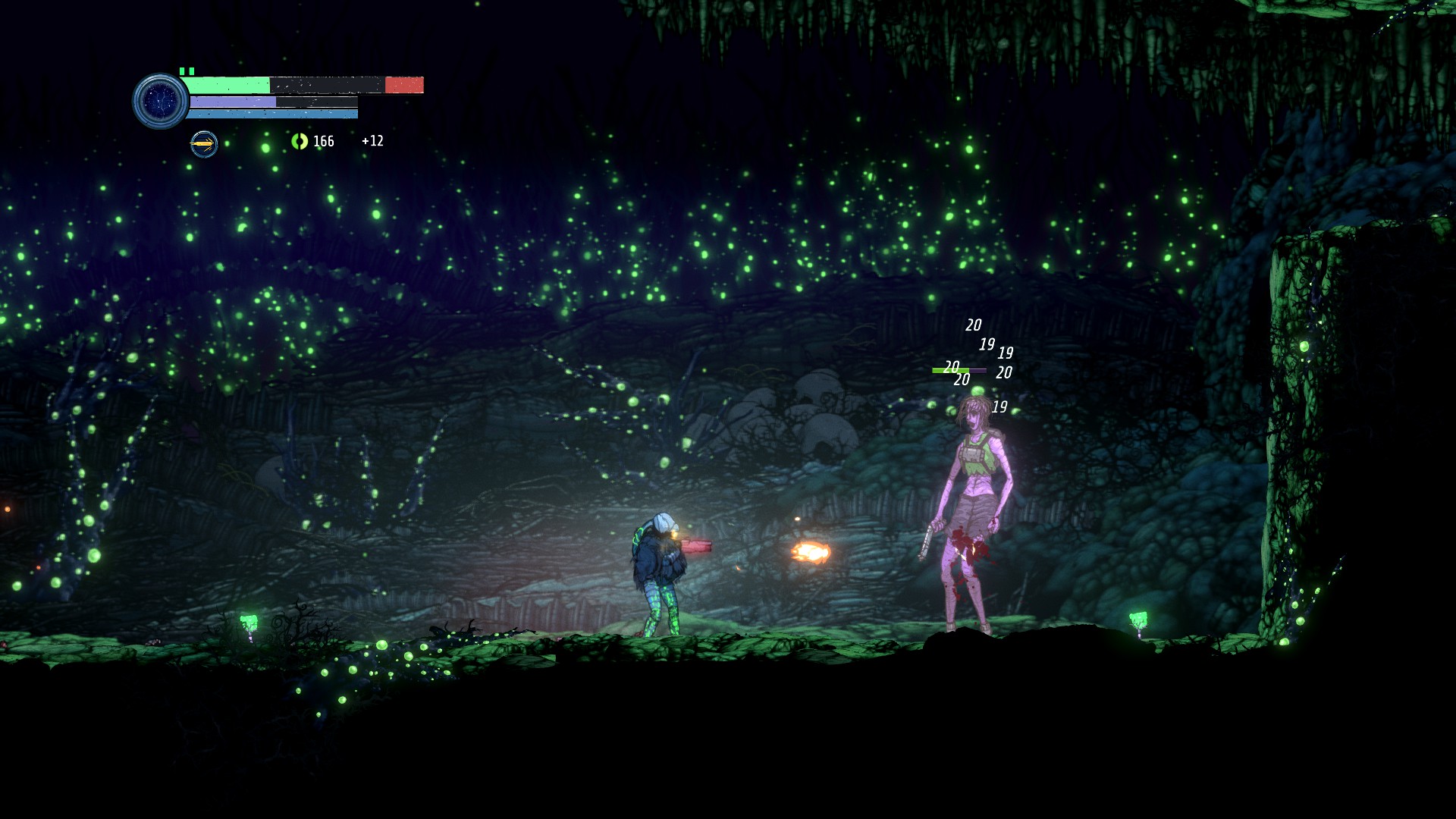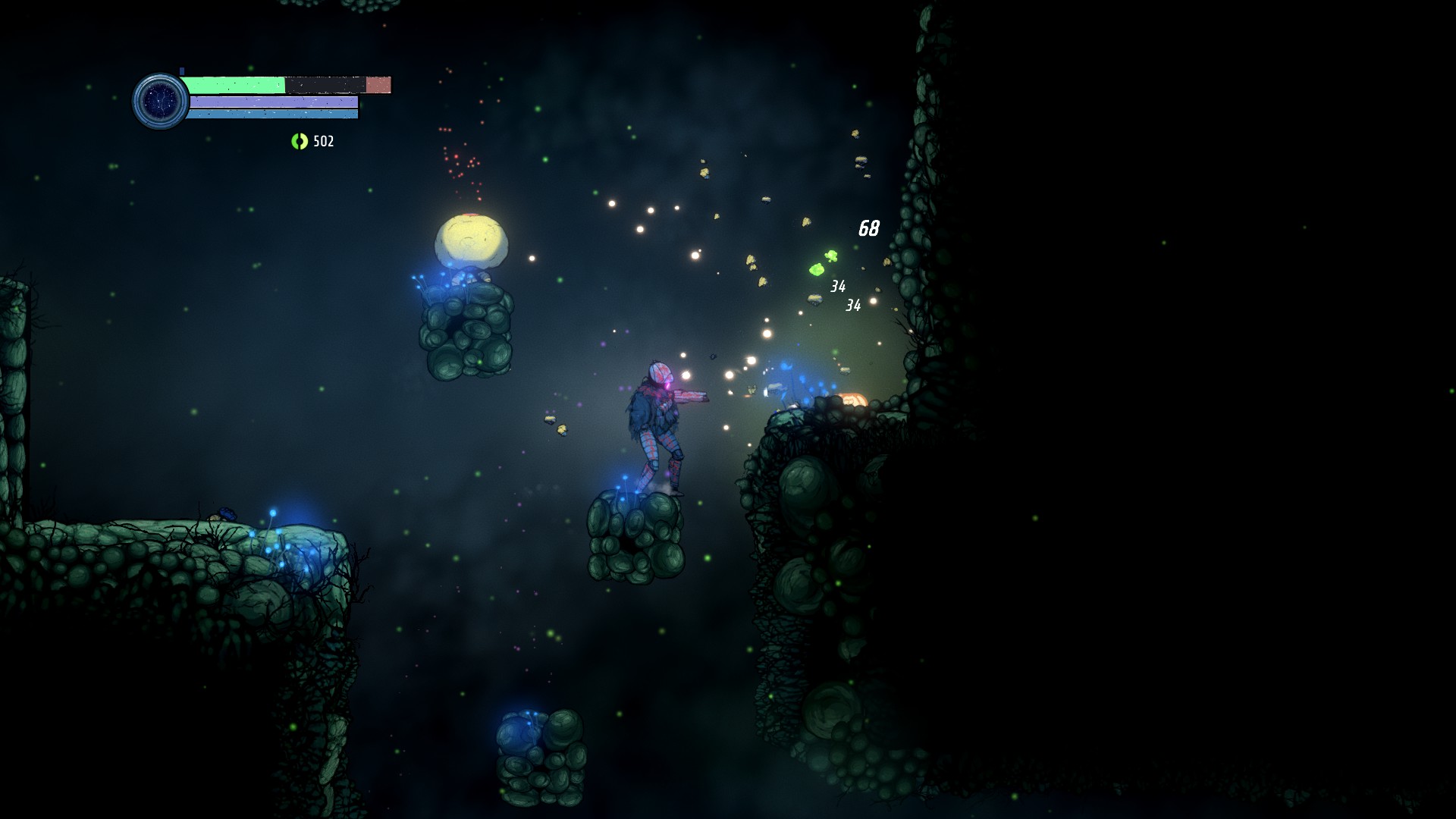Our Verdict
After a promising opening, Ghost Song collapses under the weight of its ill-conceived mechanics.
PC Gamer's got your back
What is it? A sci-fi metroidvania with a smattering of soulslike mechanics.
Expect to pay: £15/$20
Release date: Out now
Developer: Old Moon
Publisher: Humble Games
Reviewed on: Nvidia RTX 3060, i5-11400F, 16GB Ram
Multiplayer? No
Link: Official site
Repetition is the bread and butter of any enjoyable metroidvania but, as I trudge my way through the seemingly endless maze of Ghost Song's samey underground corridors in search of the next story beat, it's hard not to wonder where things went wrong. First impressions are deceptively strong, thanks in no small part to an alluring hand-drawn art style, though as you begin to get to grips with its clunky combat and confusing level design the frustrating limitations of its mechanics come to the fore.
You play as the Deadsuit, a robotic entity who wakes from an ancient slumber on the desolate planet of Lorian. Your true name and origin are shrouded in mystery, so the first order of business is exploring this unfamiliar environment as you set out on the search for answers. The eerie and oppressive atmosphere that shapes the planet's surface is immediately enthralling. Everything is bathed in a sinister, supernatural glow, and the beautiful background art is littered with the remains of countless crashed spacecraft in a manner that evokes a pressing sense of isolation and decay. As you venture underground, this art direction remains a consistent highlight and the Metroid roots are clearly visible in the Deadsuit's intriguing design—which accommodates a faceless visor and a familiar arm-mounted plasma cannon.
It's only as you begin to encounter Lorian's army of mutated inhabitants that the first of many major oversights becomes painfully apparent. An awkward keyboard control scheme makes the Deadsuit a far more cumbersome hero than any of Nintendo's protagonists and, while the unwieldy bindings can mercifully be tweaked from the options menu, a baffling lack of mouse support means that your aiming is significantly hampered while playing with a keyboard. It is simply impossible to aim at certain angles using the arrow keys and, while this can be swiftly remedied through the use of a compatible controller, this limitation renders several of the later sections that are dominated by fast-flying enemies almost impossible to complete.
It's only as you begin to encounter Lorian's army of mutated inhabitants that the first of many major oversights becomes painfully apparent.
Even with a controller in hand, traversal feels sluggish thanks to a slow maximum walking speed and an inexplicably floaty jump. As you would expect from the genre, further movement options are gradually unlocked as you progress, including a much-needed double jump and the ability to sprint, but it's hard to ignore the frankly unpleasant degree of imprecision that pervades most attempts at platforming throughout your journey. The combat suffers from a similar degree of sloppiness, where bizarre hitboxes had me dying as the result of enemies hitting through solid surfaces on at least a dozen occasions.
Then there's the truly diabolical dodge which is incredibly hard to judge by eye and generally sends you clipping forward into the clutches of larger enemies for a near-instantaneous death. It is perhaps one of the least effective evasive manoeuvres ever implemented, The visible meter measuring the brief period of invincibility accompanying every few dodges is a positive addition, however, providing an intuitive alternative to more opaque invincibility frames characteristic of other Souls-likes, but there were plenty of occasions where it simply failed to correlate with the damage I was receiving.
These issues are most apparent in the boss fights, where a gauntlet of repetitive encounters filled with oversized hitboxes and inconsistent attack patterns push the combat system to its absolute limit. They seem more like a test of patience than skill, a sentiment only reinforced by the poor placement of save points, forcing you to waste time dragging yourself back to the fight after an unfair death.
There is still a glimmer of hope in Ghost Song's foundations.
There is still a glimmer of hope in Ghost Song's foundations, however, and one mechanic which sees your projectile weapon overheat with prolonged use while buffing melee damage leads to a pleasant rhythm of chipping away at a weaker enemy's health before landing a satisfying killing punch. The upgrade system is similarly enjoyable, presenting a varied selection of new suit and blaster enhancements, or modules, to discover. Each is delightfully unique, and highlights include launching a barrage of friendly slimes towards your adversaries and the far more practical ability to see enemy health bars. Every slain foe also rewards a burst of nanocells, a currency which can then be spent on additional stat upgrades at statues—hulking fallen robots situated near a small number of save points.
Keep up to date with the most important stories and the best deals, as picked by the PC Gamer team.
On the standard difficulty, death not only causes you to drop your current collection of nanocells but also depletes your overall health pool. This can only be restored by spending yet more nanocells at a statue, creating something of a catch-22. The only time you need to repair the Deadsuit is right after you have died and lost all of your cells, a time when your newly diminished health bar makes it considerably more difficult to reach a statue. The amount required for repair is thankfully very low, but the fact that statues are so few and far between means they often require a substantial detour to reach. It's an entirely unnecessary chore that seems to serve little purpose beyond wasting your time.
The frustration is only further compounded by the basic map design. You'll spend the entirety of the game in a single dungeon, and even with several of the late-game traversal options unlocked your options for exploration remain disappointingly linear. With the number of interconnected zones kept to a minimum, there are a few substantial shortcuts overall and the vast majority of the roughly ten hours required to complete the story is spent backtracking through familiar territory. It's immensely wearing and although a few interesting sights stand out from the crowd (a number of the more eerie and abstract locations later on immediately come to mind) the underground locale is also home to an upsetting number of near-identical dimly lit corridors.
At a time when there are new metroidvanias appearing constantly, and classics like Dead Cells keep spitting out intriguing updates, Ghost Song has very little to offer. Just let Deadsuit stay dead.
After a promising opening, Ghost Song collapses under the weight of its ill-conceived mechanics.
With a gaming knowledge that ranges from news on the latest Nintendo Switch otomes to almost 4,000 hours (and counting) wasted in Hitman: Absolution, there’s almost nothing Dashiell won’t play. He spends the portion of his days not allocated to more Hitman: Absolution time trying out new games or desperately tweaking the spelling of his upcoming articles. As a freelance writer, he can also be found in PLAY magazine and SFX among others.





